|
November 29, 2018
Post Office -- No to Liberal
Back-to-Work Legislation!
Postal Workers Treated Like Criminals
by Trudeau Government
- Louis Lang -
PDF
Post
Office
--
No
to
Liberal
Back-to-Work
Legislation!
• Postal Workers Treated Like Criminals by
Trudeau Government - Louis Lang
• Canada Post Not the Workers Has Been
Withholding Social Assistance
Cheques - Canadian
Union
of Postal Workers
• Renewed Attacks on Postal Workers: We Take
It Personally! - Pierre Soublière
• Postal Workers Demand Justice as Trudeau
Meets with Corporate Calgary
• Photo Review: Postal Workers' Rotating
Strikes and Occupations
General Motors to
Close Auto Plant in Oshawa, Ontario
• Unifor Local 222 Holds Press Conference on
Oshawa GM Plant Closure
• Unifor Calls on General Motors to Allocate
Product to Oshawa - Unifor
Quebec Construction
Workers Uphold Their Rights
• Opposition to the Police Regime Against
Construction Workers -
Pierre Chénier
Alberta Workers Oppose
Anti-Labour Laws
• Local 110 Insulators Rally at Alberta
Legislature - Peggy Askin
• Anti-Worker Labour Laws Must Be Repealed
- K.C. Adams
• Alberta Boilermakers and Operating
Engineers Fight to Overturn Anti-Worker Labour Laws
Post Office -- No to Liberal Back-to-Work
Legislation!
Postal Workers Treated Like Criminals
by Trudeau Government
- Louis Lang -
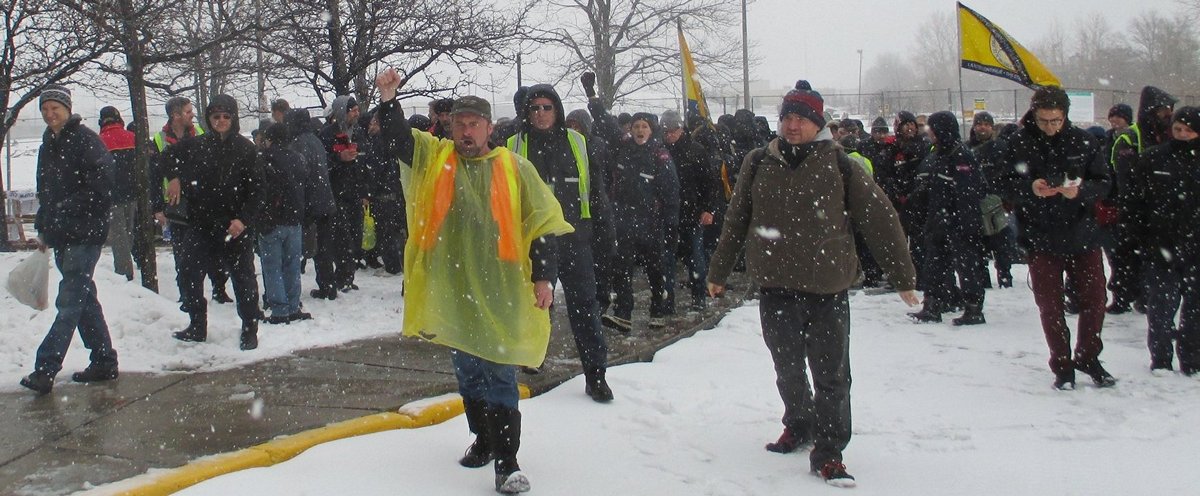
Postal workers in Ottawa walked off the job November
26, 2018, upon hearing the Senate had
voted in favour of adopting the
Liberal government back-to-work legislation.
After a weekend of debates and hearing the testimony of
several witnesses concerned in the failed negotiations between Canada
Post and the Canadian Union of Postal Workers (CUPW), the Senate of
Canada
adopted the Trudeau government's back-to-work legislation, Bill C-89.
On Monday evening, November 26, the Senate
voted 53 to 25 with four abstentions and the Governor General
gave Royal Assent to the legislation which was announced at 9:00
pm that evening.
This action of the government outlawed the right of
postal workers to strike to force Canada Post to take their demands
seriously.
 Bill C-89 requires the
union to instruct the workers to report for work by noon on
November 27. Failure to obey the law can result in the
imposition of fines of $1,000 to $50,000 per day on anyone
found in contravention of the Act and up to $100,000 per day
against Canada Post and the union if they are
found guilty of a violation of the law. Bill C-89 requires the
union to instruct the workers to report for work by noon on
November 27. Failure to obey the law can result in the
imposition of fines of $1,000 to $50,000 per day on anyone
found in contravention of the Act and up to $100,000 per day
against Canada Post and the union if they are
found guilty of a violation of the law.
Labour Minister Patty Hajdu, speaking on behalf of the
government said:
"Back-to-work legislation is a last resort and not
something we take lightly. However, having exhausted all other options,
it is necessary to protect the public interest and avoid further harm
to the Canadian economy."
This declaration shows the utter bankruptcy of the
Trudeau government. It claims to stand for free collective bargaining
but as soon as workers fight to defend their just demands its hypocrisy
and unprincipled character are revealed.
In Canada and abroad Justin Trudeau makes pious
statements about being a "feminist" and he touts his deep concern for
the rights of women. But when it comes to working women demanding to
have their rights recognized, the hypocrisy and cynical disregard and
manipulation of public opinion are palpable. There are 8,000 Rural
and
Suburban Mail Carriers (RSMCs) of which more than 80 per cent are
hard-working women who have been discriminated against by Canada Post
for many years. Now they are demanding the simple right to be paid for
all hours worked like all other postal workers and Canada Post has not
budged one inch for almost a year. Trudeau's
answer to these women workers is to criminalize the just struggle of
postal workers for their rights.
Minister Hajdu is far from
being honest in her statement that "all options have been exhausted."
The government has been aware that, for close to a year, Canada Post
has refused to negotiate and it is now intervening on behalf of the
corporation. Everyone knows that Canada Post is a Crown corporation and
as such is under the executive
control of the Federal Cabinet. The government must answer for the
actions of the corporation which has arrogantly refused to negotiate
and relies on the government to impose a contract through federal
legislation.
Hajdu exposes the unprincipled stand of the government
when she says that "it is necessary to protect the public interest and
avoid further harm to the Canadian economy." What "Canadian economy" is
she talking about? Are the workers not part of this economy? Does
disrespecting their rights not cause harm to the economy? Do they not
have a human right to proper working conditions which protect their
health and safety and eliminate the overburdening faced by the workers
due to elevated parcel volumes?
The "economy" and "public interest" Hajdu is talking
about has nothing to do with anything except the self-interest of the
rich. The "public interest" in Hajdu's deceptive statement refers to
the main concern of the Trudeau government to protect the profits of
multi-national corporations like Amazon, E-Bay and other enterprises
based on
internet trading platforms. No one can deny that these corporations
have grown into multi-billion dollar behemoths who have come to control
this sector
of the economy in a short period of time and it is undeniable that the
source of their success is the exploitation of the labour and blood and
sweat of postal workers and other workers in the communications
sector.
Postal workers have put this government on notice that
they are not fooled by Hajdu's double talk. They know that when Hajdu
talks about "the harm to the Canadian economy," it is the threat to
maximum profits for these corporations that she is referring to.
For the Trudeau government, the destruction of 2,500
jobs by Bombardier and its partner Airbus, and the closing of the GM
plant in Oshawa affecting another more than 2,500 workers are not
worthy of consideration for the damage this wrecking of manufacturing
inflicts on the economy.
 Glib statements are made by
the Trudeau Liberals to justify criminalizing the struggle of postal
workers and it shows how despicably self-serving they are. Anything can
be said at any time to justify their schemes and to impose their
dictate on the working people, because they submit to the dictate of
the financial oligarchs who demand ever greater
profits and claim that this is the proof of a healthy economy. Glib statements are made by
the Trudeau Liberals to justify criminalizing the struggle of postal
workers and it shows how despicably self-serving they are. Anything can
be said at any time to justify their schemes and to impose their
dictate on the working people, because they submit to the dictate of
the financial oligarchs who demand ever greater
profits and claim that this is the proof of a healthy economy.
Like the Harper Conservatives, this government speaks
out of both sides of its mouth when it comes to attacking the rights of
workers. It was not so long ago that the government and the think tanks
of the ruling elite waged a massive campaign to prove that the public
post office was a thing of the past. Reams of statistics were produced
to show that the post office was dying and an "increasingly useless
anachronism in the digital age." We were told that like newspapers, the
post office was no longer needed. First class mail was in serious
decline and, even though Canada Post showed profits each year, this
would soon end. Dire predictions from experts tried to convince us that
Canada Post would soon accumulate a massive debt which would have to be
paid for by "Canadian taxpayers."
The alarmist statements and the relegation of the post
office to irrelevance for the Canadian economy were all done to
justify the privatization of Canada Post and the destruction of the
public post office. The main goal of privatization, which continues to
the present day, is to attack the rights of postal workers to proper
wages, benefits
and working conditions and to facilitate the handing over of the most
profitable parts of Canada Post to monopolies like FedEx, UPS, DHL and
others.
Of course we know that the predictions of financial
doom were lies based on a cynical outlook which favours privatization
of public assets for private gain and the destruction of the public
post office and its obligation to provide universal postal service to
all Canadians.
To justify Bill C-89 we are now told that the post
office
which had been declared to be irrelevant plays such a crucial role
in the Canadian economy that federal legislation is needed to
"defend the economy." This is Liberal pragmatism, to say whatever is
required to push their bankrupt policy of managing the economy on
behalf of the
rich.
As far as the 50,000 postal workers are concerned,
they are not confused about the decisive role they play in providing
communications services to all Canadians. The workers process and
deliver mail in every corner of the country, working seven days a
week, 24 hours per day, in all conditions and in addition to their
demands for
decent wages and working conditions, they have always defended the need
for a public post office with the right of all Canadians to universal
postal service.
The contribution of postal workers to the Canadian
society gives them the right to make claims to be treated with dignity
and be given the conditions they require to perform their duties.
The action of the Trudeau government to treat postal
workers like criminals cannot be allowed to pass. The workers' demands
to negotiate and not to be subjected to dictate is a right which any
government worthy of the name must uphold.

Canada Post Not the Workers Has Been
Withholding Social Assistance Cheques
- Canadian Union of Postal Workers -
[On November 22], as she introduced the
government's back-to-work legislation, Labour Minister Patty Hajdu told
the
House of Commons that the most vulnerable Canadians relied on Canada
Post for cheques and had been negatively affected by the rotating
strikes, referencing a man named Jack, who told her he could lose his
home if he
didn't receive his disability cheque.
 Postal workers in many
locations are reporting to the Canadian Union of Postal Workers (CUPW)
that Canada Post management has directed them not to deliver any letter
mail, including pension cheques and social assistance cheques -- a
direct violation of an agreement signed by CUPW and Canada Post to
deliver these types of
cheques during strikes or lockouts. Postal workers in many
locations are reporting to the Canadian Union of Postal Workers (CUPW)
that Canada Post management has directed them not to deliver any letter
mail, including pension cheques and social assistance cheques -- a
direct violation of an agreement signed by CUPW and Canada Post to
deliver these types of
cheques during strikes or lockouts.
"Our public post office distributes government cheques
that are a fundamental part of the social safety net," says Mike
Palecek, CUPW National President. "We do not want the most vulnerable
to suffer because of our dispute with Canada Post, which is why we
signed an agreement in the first place. If people are not receiving
their cheques, it
is because Canada Post has chosen not to deliver them."
Over the past five weeks of rotating strikes, Canada
Post has manufactured crises, including a massive backlog of mail and
now denying the most vulnerable people their government cheques, to
push the government to introduce back-to-work legislation. It seems
that the government has taken the bait.
"Withholding these cheques is not only deplorable, but
is illegal and the Minister representing Canada Post should investigate
these claims immediately," adds Palecek.

Renewed Attacks on Postal Workers:
We Take It Personally!
- Pierre Soublière -
 
On Friday, November 23, postal workers and their
allies went to Parliament Hill to be present in the public gallery when
the back-to-work legislation was passed to end the rotating strikes and
force the workers back to work.
The Trudeau Liberal government had arranged for the
passing of the bill to be as expedient as possible and the debate was
therefore limited. When we arrived, it was a bit strange to find that
very few MPs were participating in the debate. Actually, almost all
the Liberal seats were empty! Then, after an ultimate drivel on the
urgency to pass
legislation against the postal workers and their demands in order to
"protect small and medium-sized businesses,'' it was 8 o'clock,
time to vote. All of a sudden, MPs started streaming in from
everywhere and in a matter of minutes, the Liberal seats were filled.
The majority of Liberal MPs were obviously intent on getting the job
done as
soon as possible while one of them was finishing his rant ridiculing
opposition MPs for being opposed to the legislation. Liberal contempt
for the working class was palpable, especially when the workers rose in
the gallery and denounced them for their cowardly behavior. A few
Liberal MPs looked up as if they had just realized we were there
and left the House, some with an air of indifference, some with
disdain,
while one of our colleagues was being handcuffed by security
guards, as if to confirm that in this place workers are definitely not
welcome.
Since 1965, postal workers have waged dozens of
struggles, some legal, some illegal, 24-hour rotating strikes,
etc. Each battle was waged on important working condition-related
issues. Many of these struggles directly contributed to important
contract wins for Federal Public Service employees. Without a doubt,
the most
memorable of these struggles, in which Trudeau senior played a
despicable anti-union and anti-worker role, was the 1978 strike.
Leaked government documents revealed that in the summer of 1977,
Trudeau had given orders to ban union meetings and the handing out of
union literature at the place of work, as well as to attack the
collective agreement, etc. In October 1978, on the very same day
the workers began a legal strike, the Trudeau government passed
back-to-work legislation and ordered an end to the strike, which the
workers did not comply with. In the days that followed, among other
things,
the RCMP raided CUPW offices and later rounded up the entire
CUPW executive and placed them under arrest. Following a trial, the
president of the union at the time, Jean-Claude Parrot -- who was in
the public gallery
on Friday and who, at 82 years old, still participates in all the
postal workers' actions in defence of their rights -- was sentenced to
three months in jail.
Postal workers have always forged ahead to defend what
belongs to workers by right and this latest attack by Trudeau the
Second must be militantly denounced in every place of work. It must be
shown that when you negate the right of workers to negotiate their
terms of employment and force them to go back to a job that the
employer
has rendered impossible and downright dangerous, we take it personally!

Postal Workers Demand Justice as Trudeau
Meets with Corporate Calgary
 
On November 22, just hours after the Trudeau government
introduced its
anti-worker Bill C-89, An Act to provide for the resumption and
continuation of postal services, Calgary postal workers came out in
force to hold Prime Minister Trudeau to account for criminalizing their
right to negotiate their collective agreement. Trudeau came to Calgary
to
speak to the Calgary Chamber of Commerce and meet with senior
executives of the oil and gas monopolies. Around 400 postal
workers filled the street outside the Hyatt Hotel, chanting Negotiate, Don't Legislate and
slogans against the dictate of the Trudeau government and for their
just demands.
Robert Scobel, a past-president of the Calgary local of
the Canadian Union of Postal Workers and veteran postal
worker, spoke to the postal workers and their supporters.
"Trudeau's father sent our National President [Jean-Claude Parrot] to
jail for defending our right to negotiate our own contract. Postal
workers are here today because they will not stand for Trudeau Number
Two interfering
with their right to negotiate their own contract."
All throughout the two hour action the workers chanted Negotiate, Don't Legislate! loud
enough for Trudeau to hear, as he spoke to the Chamber of Commerce and
claimed to feel the pain of the working people. Over and over they
chanted, Negotiate, Don't Legislate;
Contract Now; Negotiate,
Don't Dictate; Hey
Trudeau Don't be a Jerk; Trudeau, Liar, Liar, Pants on Fire!; No
Justice, No Peace; Pay Equity Now; Who Decides? We Decide!; Canada Post
-- Time's Up! A woman postal worker led everyone in singing
union songs.
Speaking with Workers' Forum, postal workers
made the point that the 50,000 postal workers who process and
deliver the mail in the public post office want this government to stop
interfering in the collective bargaining process. Workers from many
sectors, active and retired, came with their flags to support the
postal
workers. Postal workers were excited to
receive this week's issue of Workers' Forum with the headline,
"Negotiate
Don't
Dictate!
No
to
the Criminalization of Workers' Struggles for Their Rights."
About 20 minutes after the postal workers began
their rally a large number of oil and gas employees also came to
protest the Trudeau government. The rally was organized by the energy
industry, but a concern raised in signs carried by some oil and gas
workers was their demand for jobs in face of the still staggering
unemployment
rate in this industry in Calgary.
Calgary was one of the centres out on rotating strike
on November 21 and 22. Hundreds of workers maintained the
picket lines while the rally took place.

Photo Review: Postal Workers'
Rotating Strikes and Occupations
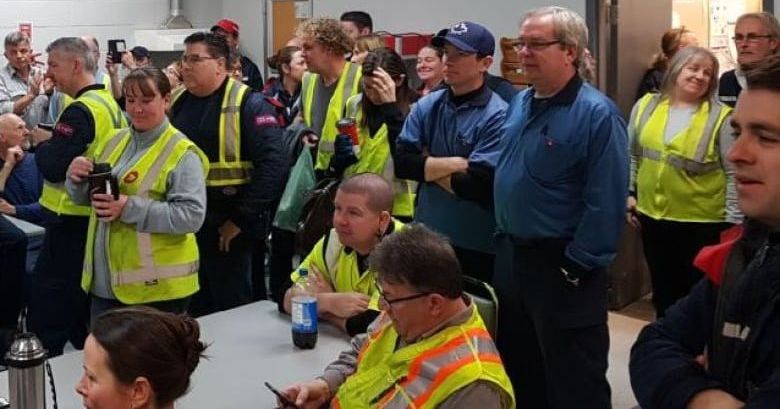
St. John's, Newfoundland, November 27, 2018, occupation of mail
processing plant.
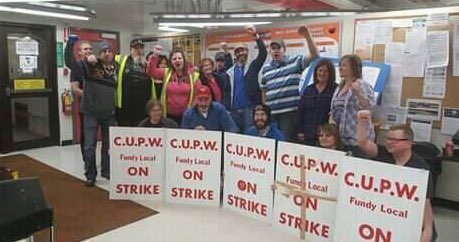
Saint John, New Brunswick, November 27, 2018 occupation of Canada Post
facility.

Rotating strike, Moncton, New Brunswick
 
Dartmouth, Nova Scotia, November 26, 2018, occupation of Canada Post
delivery centre.

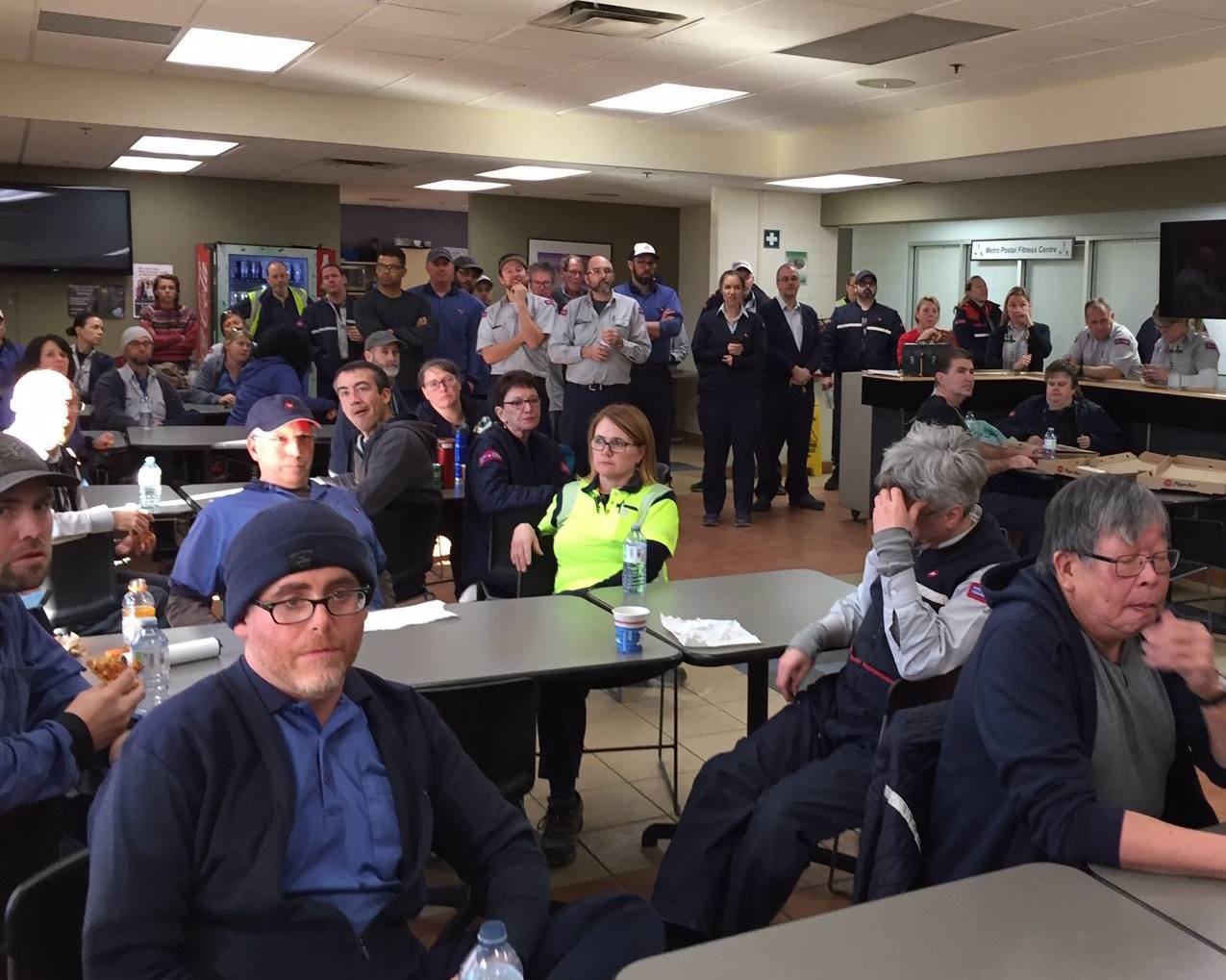 
Halifax, Nova Scotia, November 26, 2018, occupation of mail processing
plant.
 
Montreal, November 27, 2018, sit-in in Prime Minister Justin Trudeau's
constituency office.
 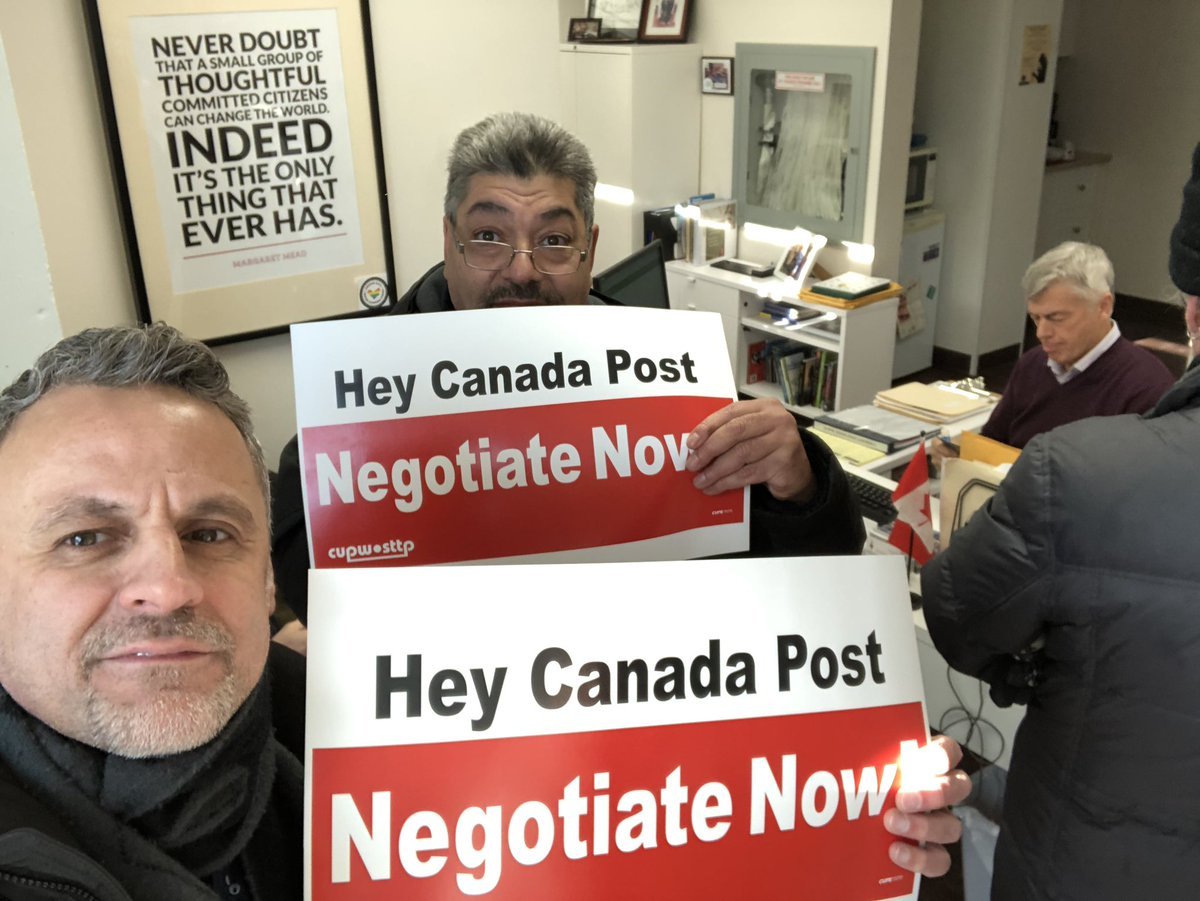
Ottawa, November 23, 2018, sit-in and press conference at Minister of
Environment and Climate Change Catherine
McKenna's office.

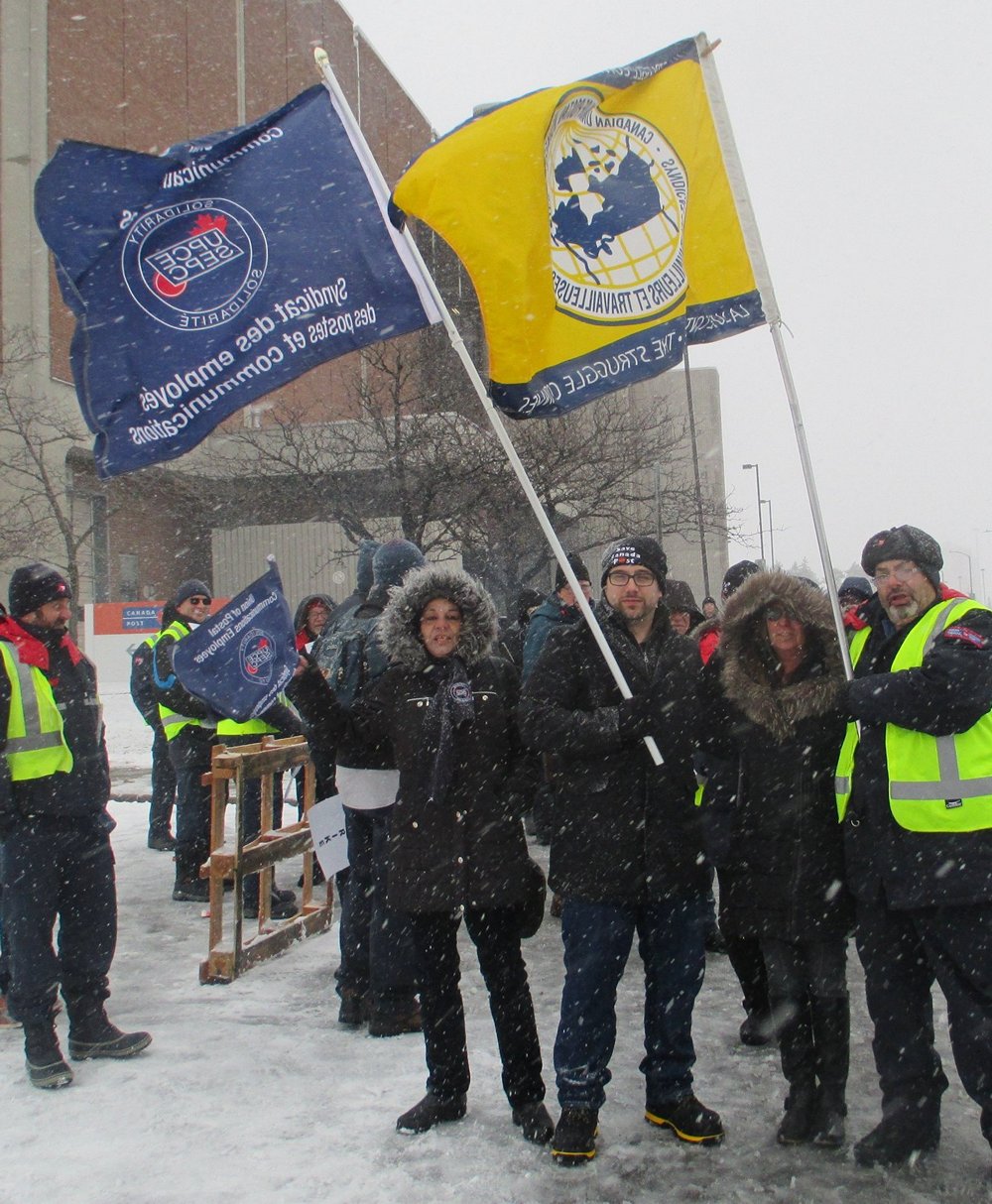 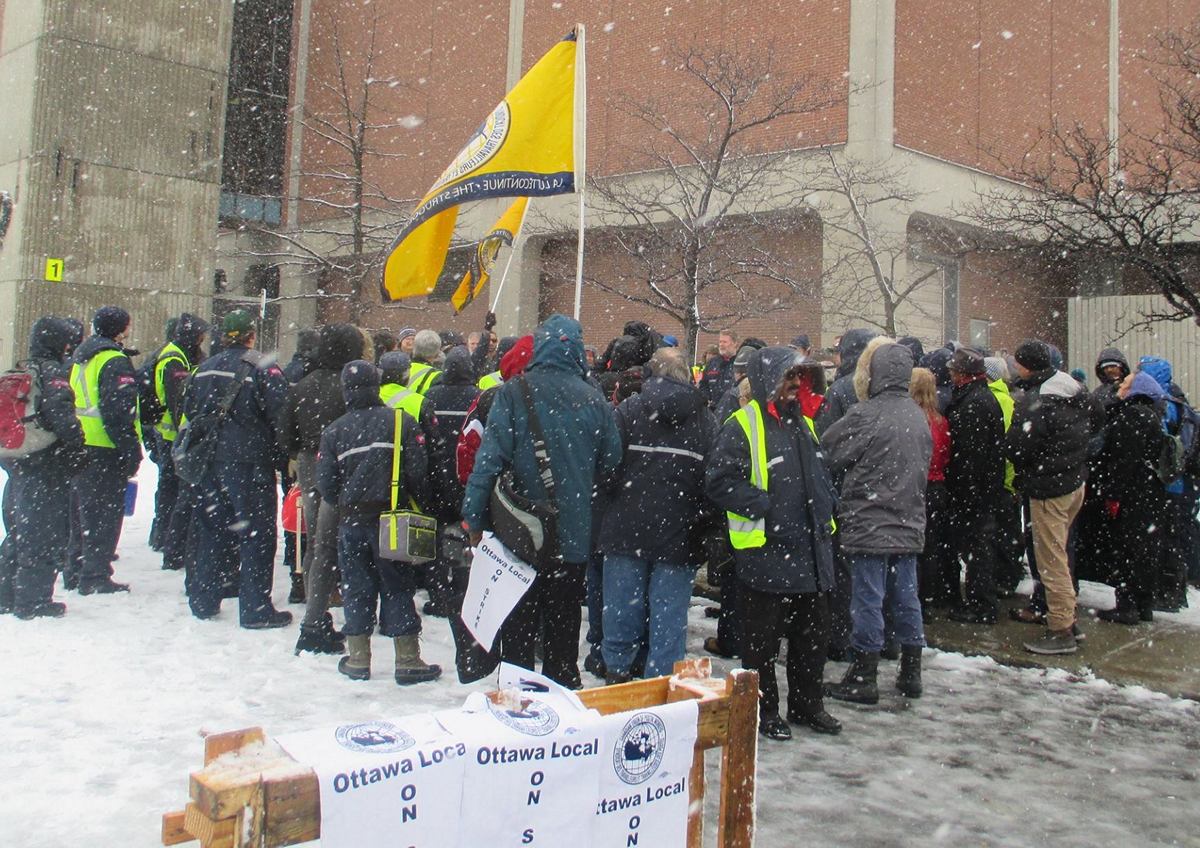
Postal workers in Ottawa walked off the job
at 11:00 pm on November 26 on learning that the Senate voted in favour
of the Liberal government's back-to-work legislation and went on the
picket lines in defiance of Bill C-89 that strips their right to free
collective bargaining. Representatives of the Union of Postal
Communication Employees joined them on the line.
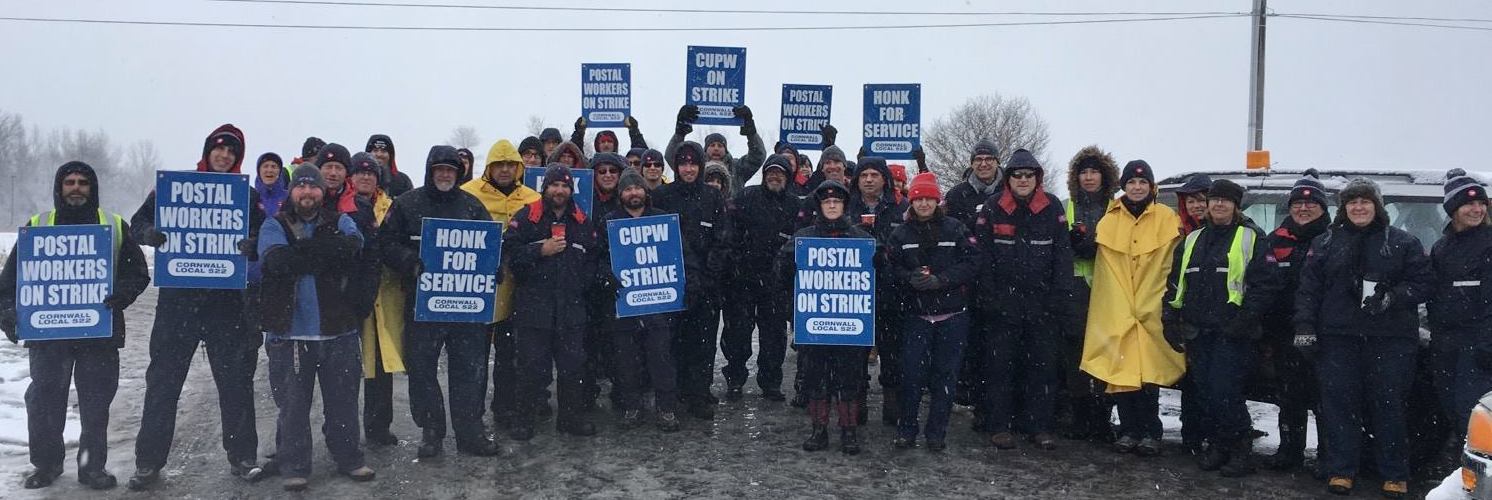
Rotating strike Cornwall, Ontario
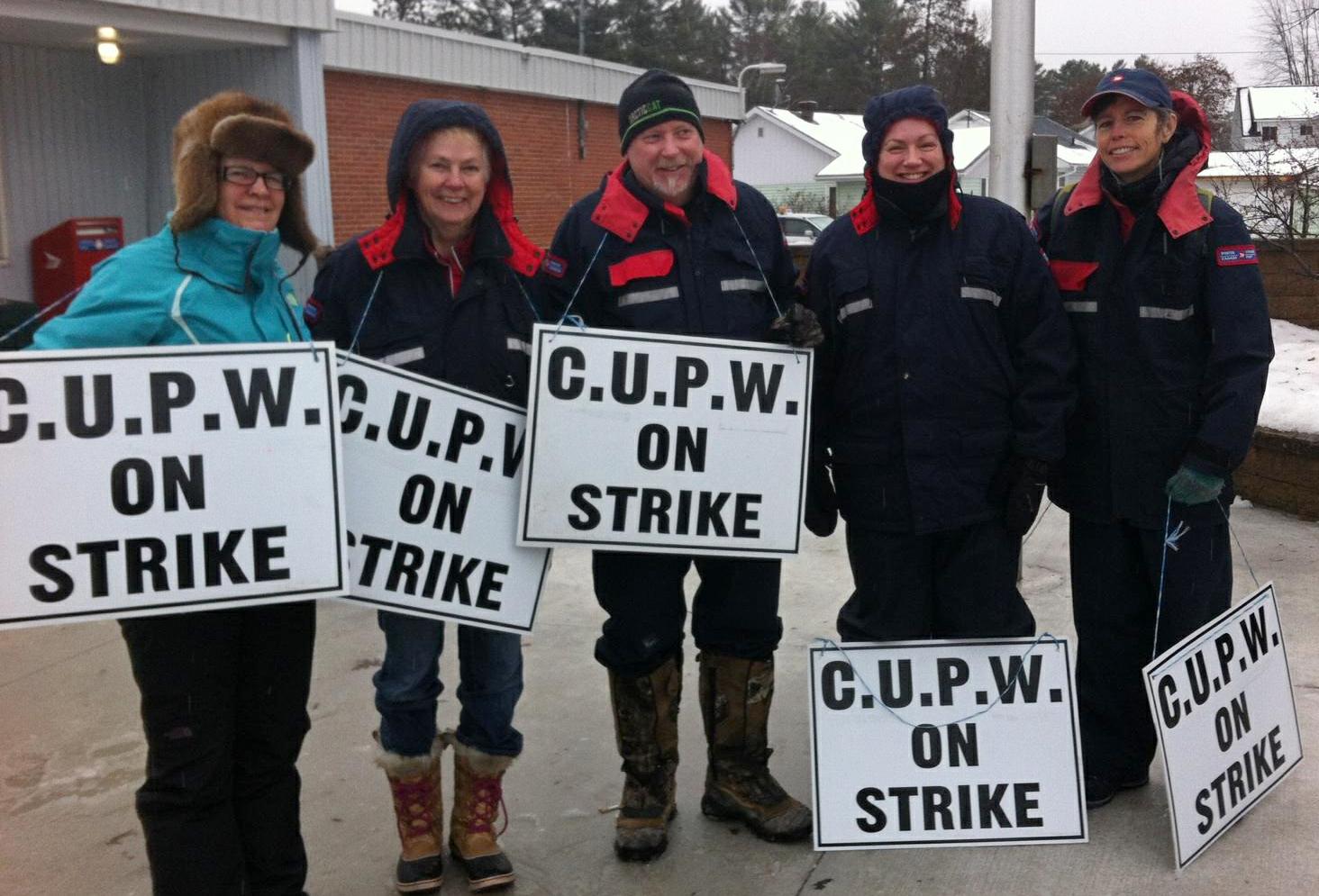 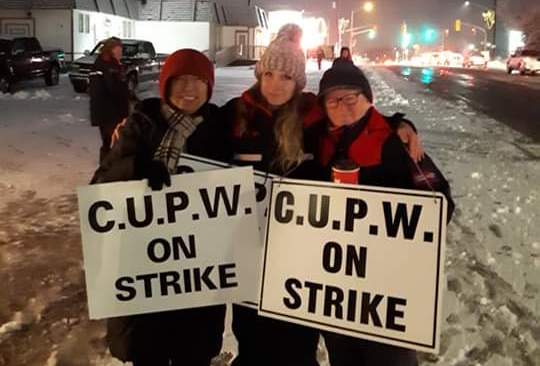
Rotating strikes: Deep River, Ontario; Petawawa, Ontario
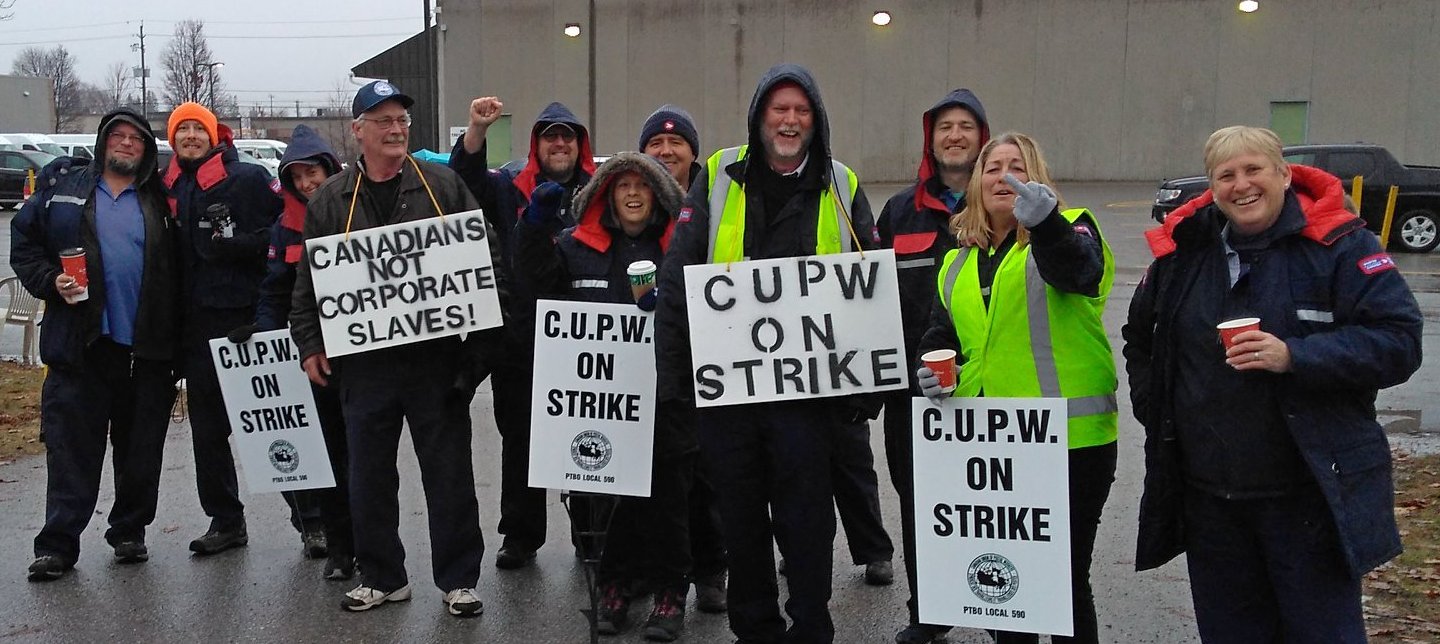
Rotating strike Peterborough, Ontario

Rotating strike Oshawa, Ontario
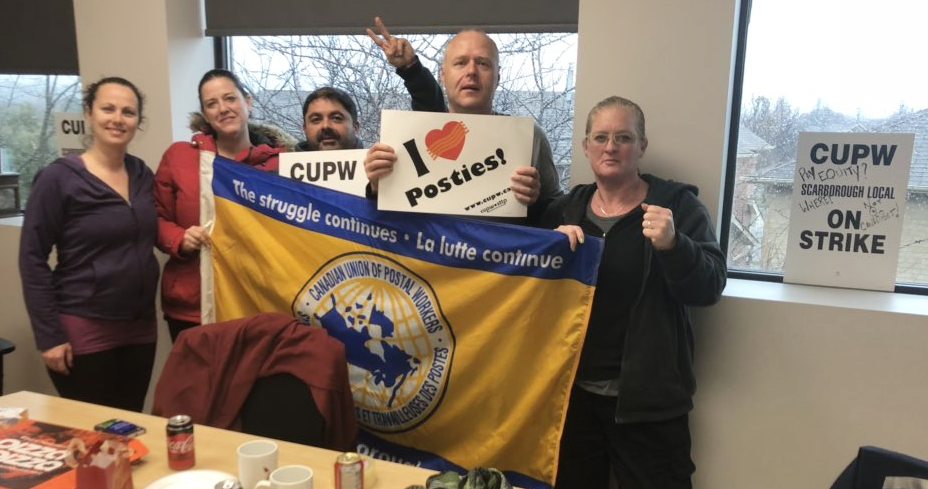
Whitby, sit-in November 26, 2018, at MP Celina Caesar-Chavannes' office.
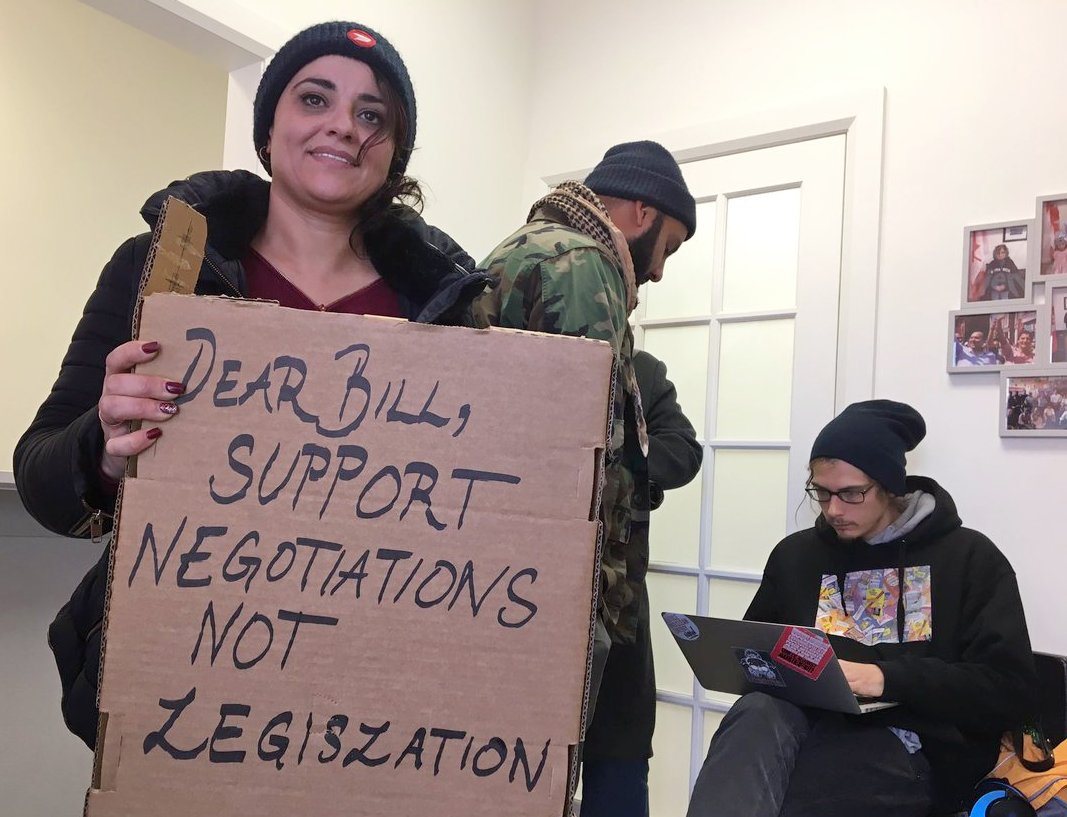 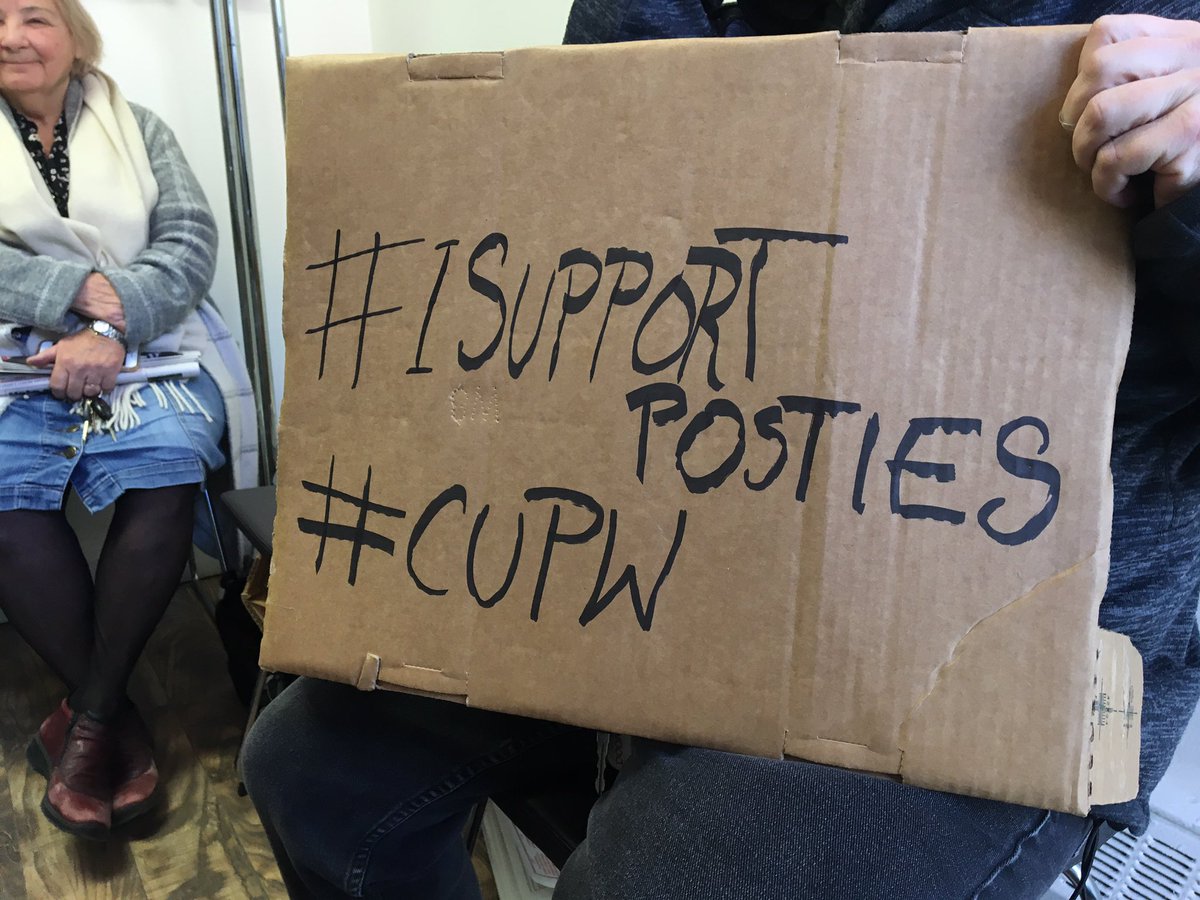
Toronto, November 23, 2018, sit-in at Finance Minister Bill Morneau's
office.

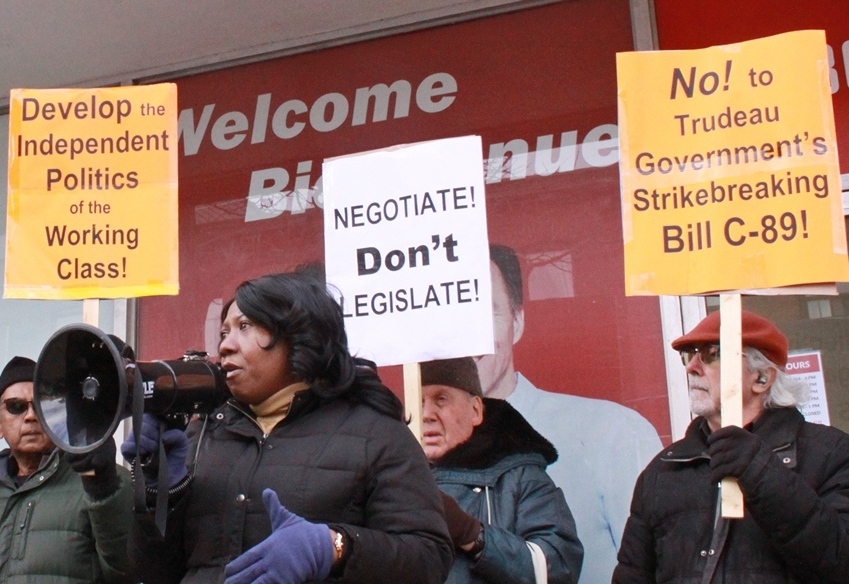 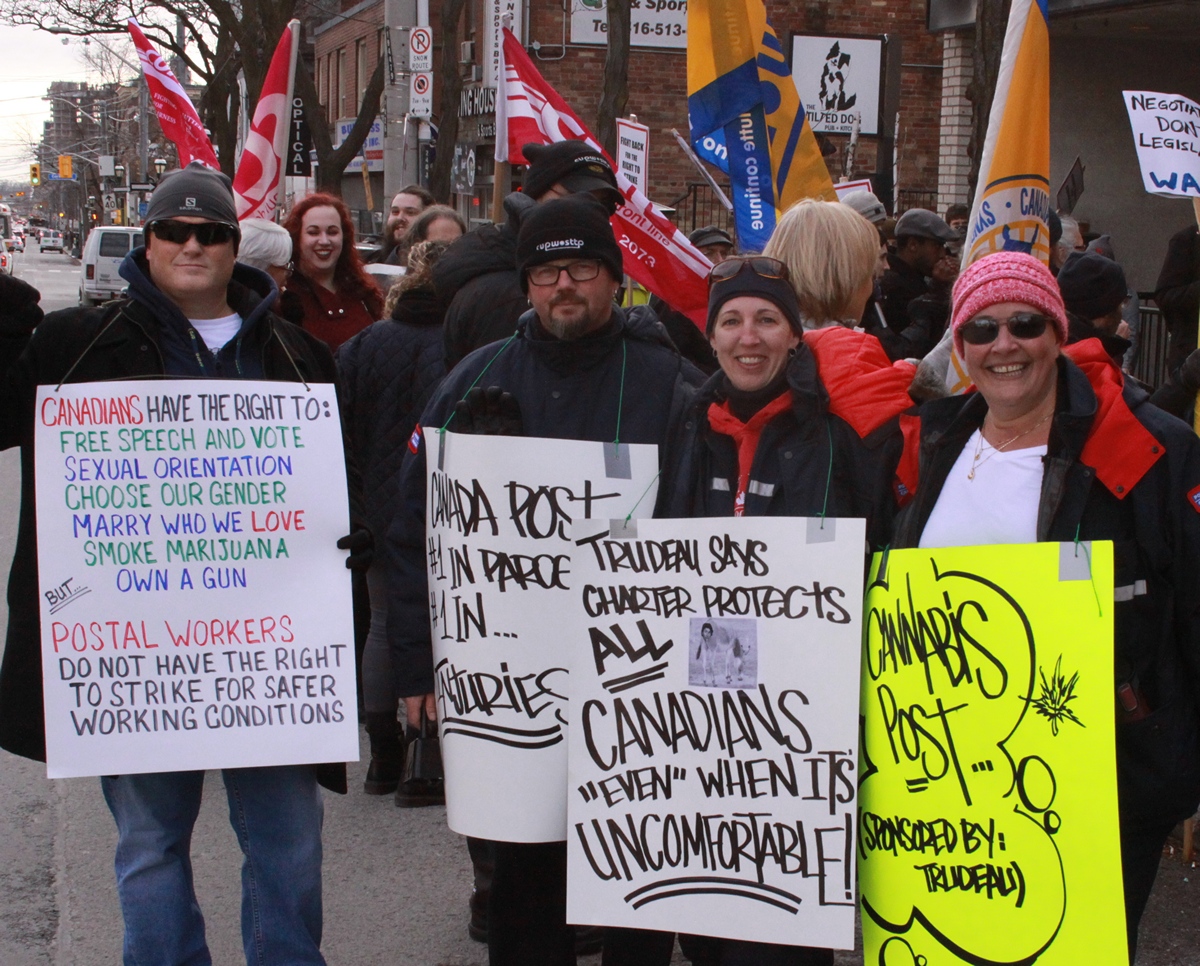
Toronto, November 28, 2018, picket against back-to-work legislation,
Finance Minister Bill
Morneau's office.
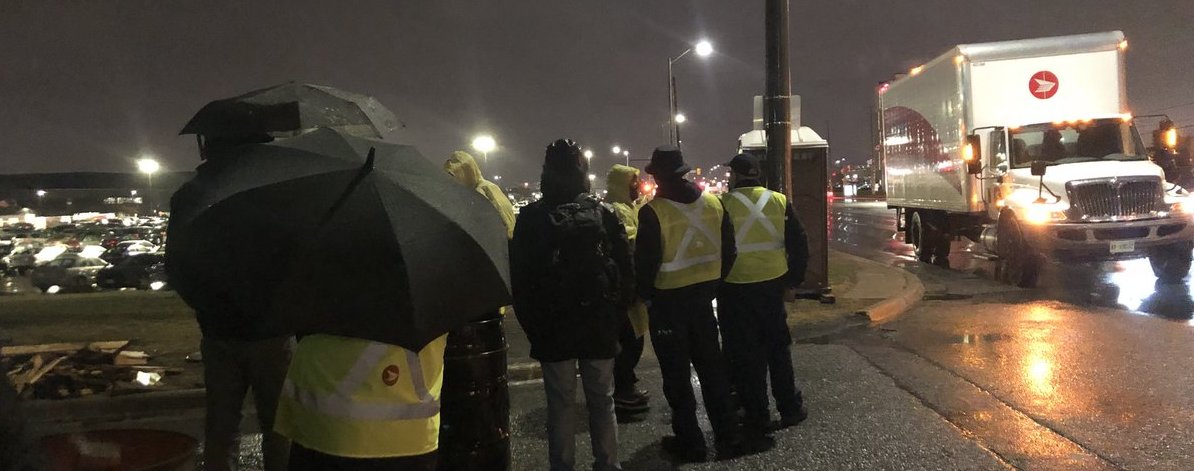
Mississauga, Ontario, November 26, 2018, pickets stop
trucks
entering plant after back-to-work
legislation passes in Senate.
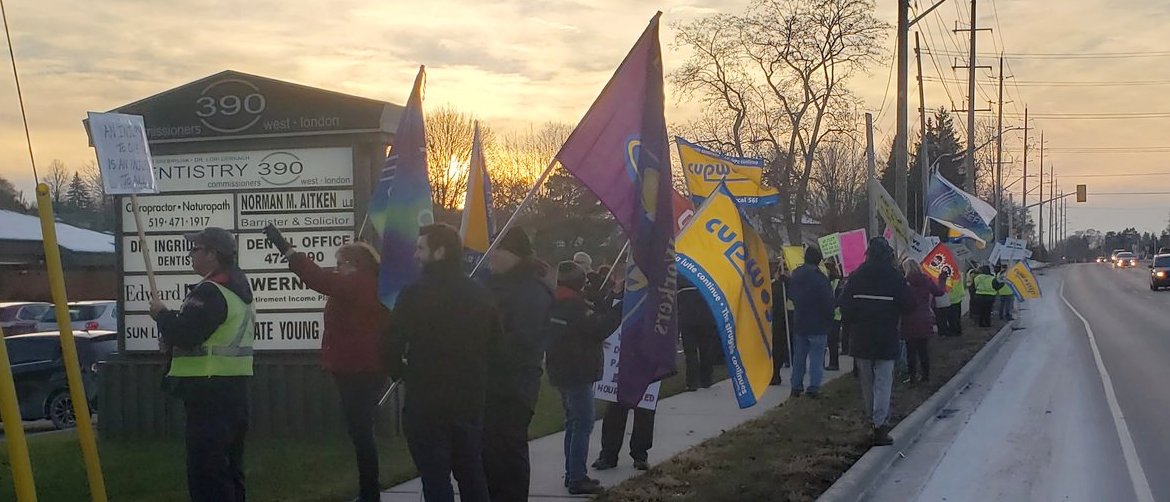
Rotating strike London, Ontario
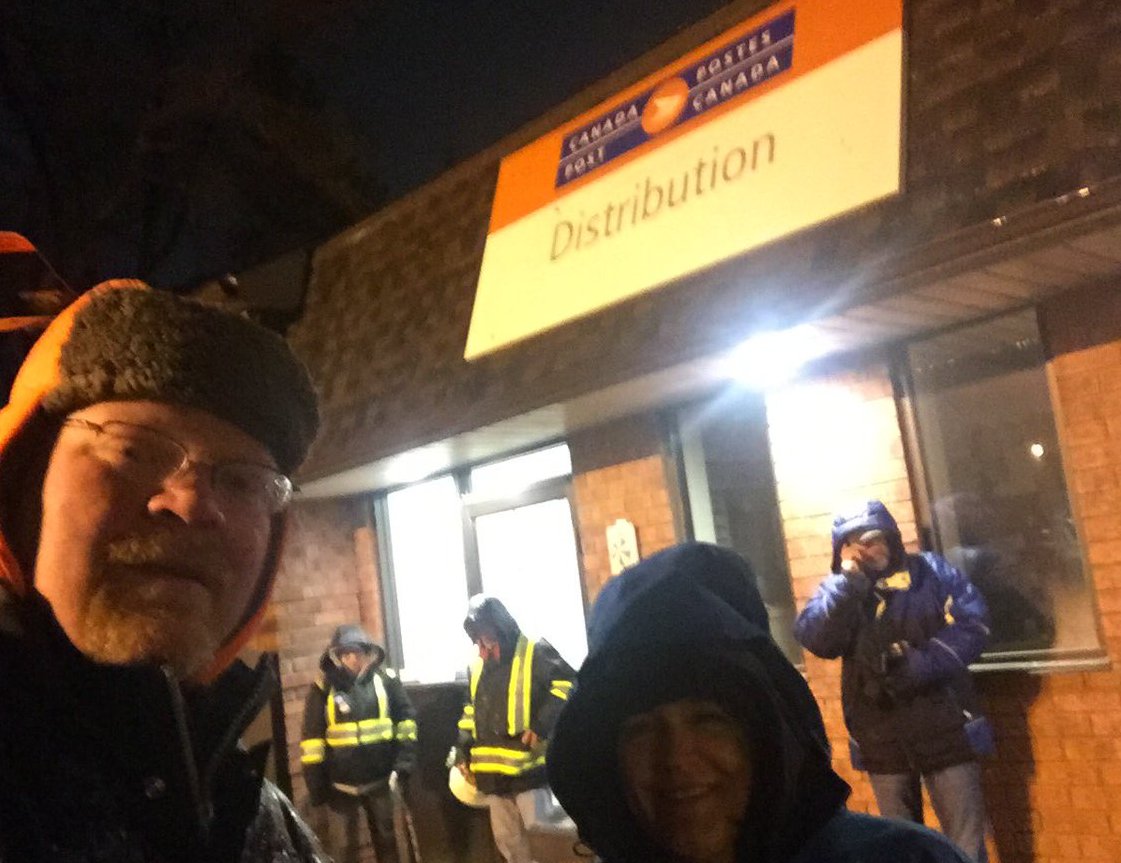 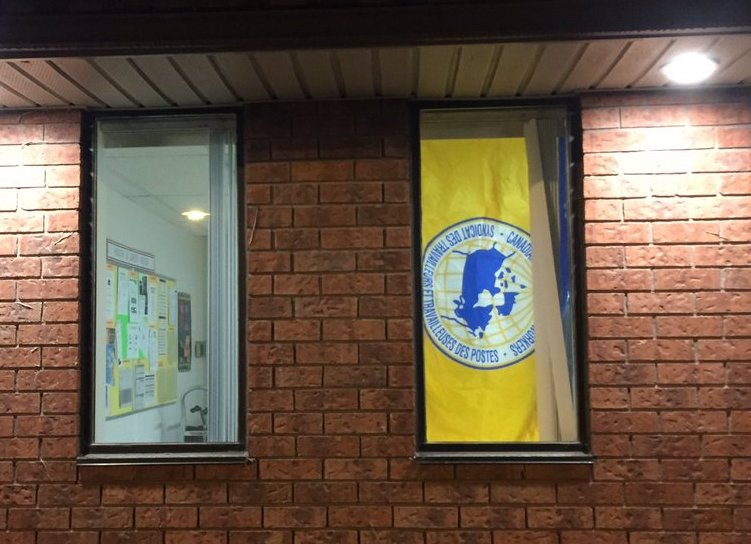
London, Ontario, November 26, 2018, occupation of distribution facility.
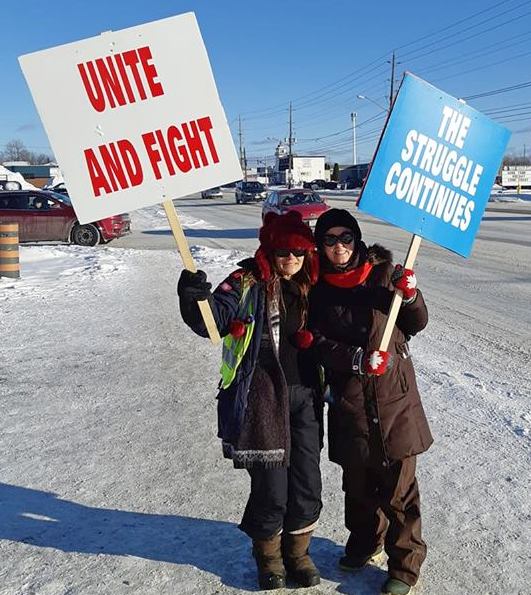 
Rotating strike Sudbury, Ontario
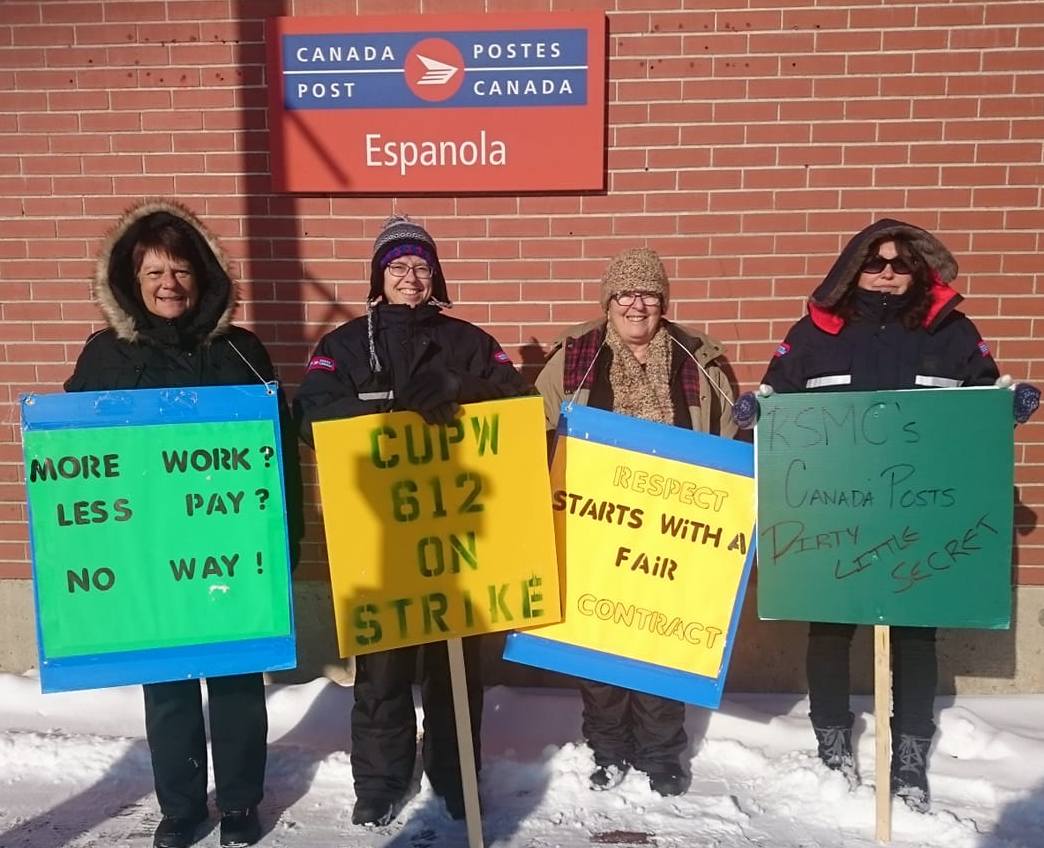 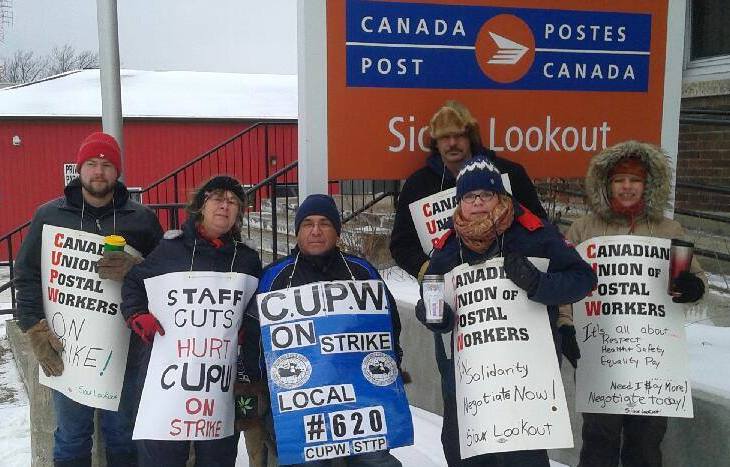
Rotating strikes: Espanola, Ontario; Sioux Lookout, Ontario
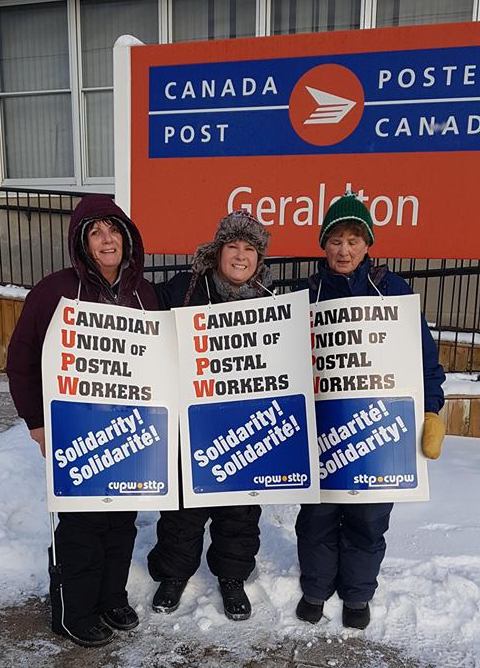 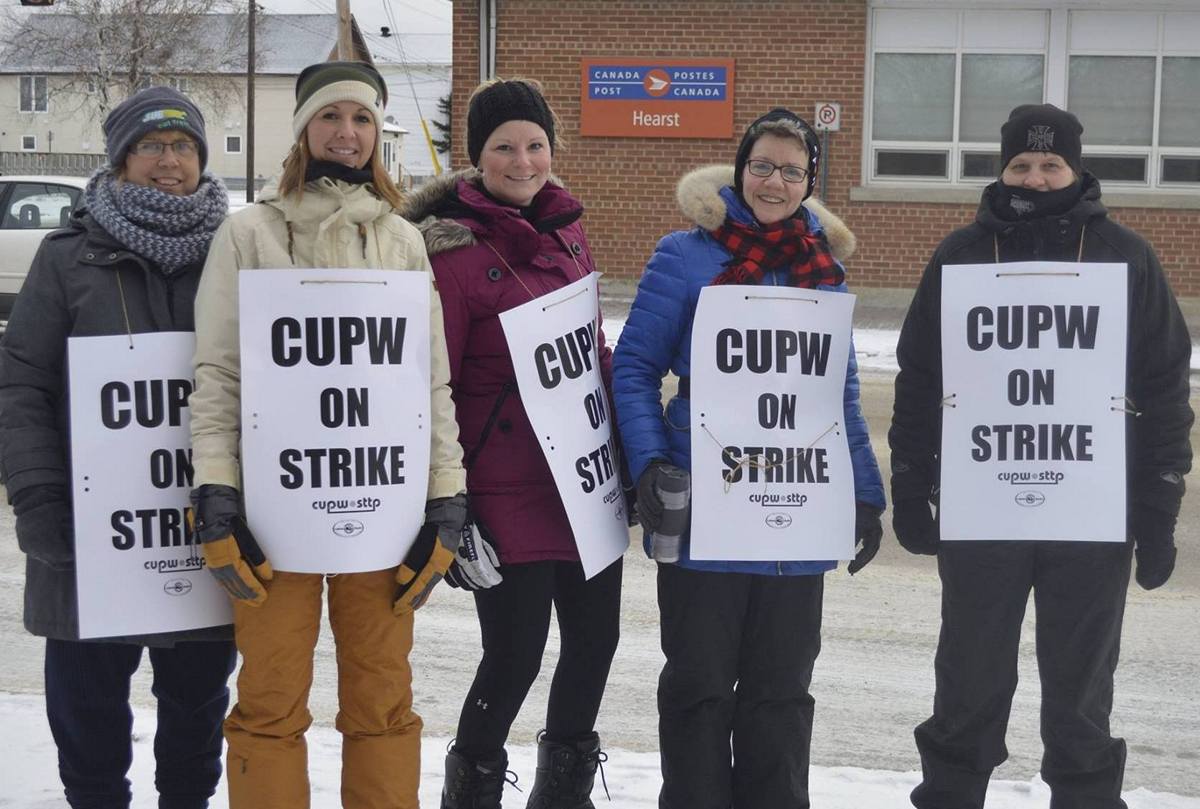
Rotating strikes: Geraldton, Ontario; Hearst, Ontario

Thunder Bay, Ontario, November 24, 2018, sit-in at MP Patty Hajdu's
office.

Thunder Bay, November 27, 2018, occupation of Canada Post processing
plant.
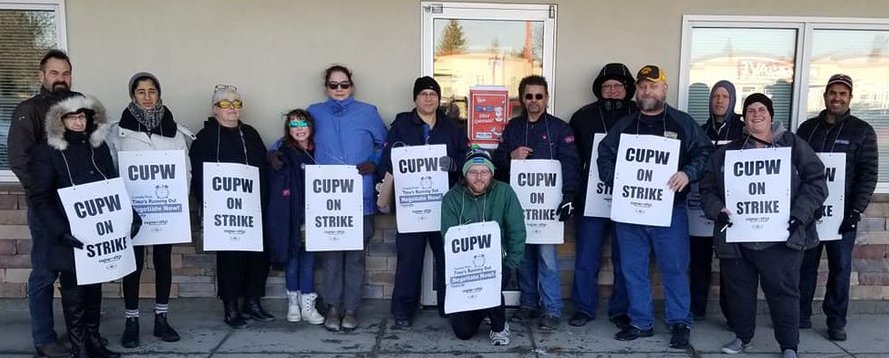
Regina, Saskatchewan, November 23, 2018, picket at MP Ralph Goodale's
office.
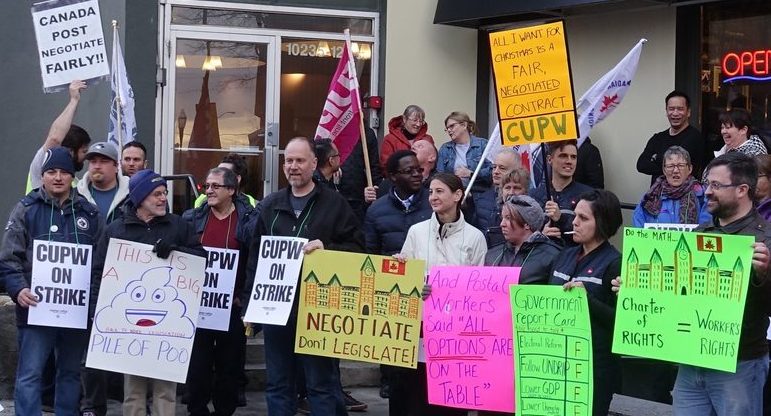
 
Edmonton, Alberta, November 22, 2018 picket at MP Randy
Boissonnault's office.
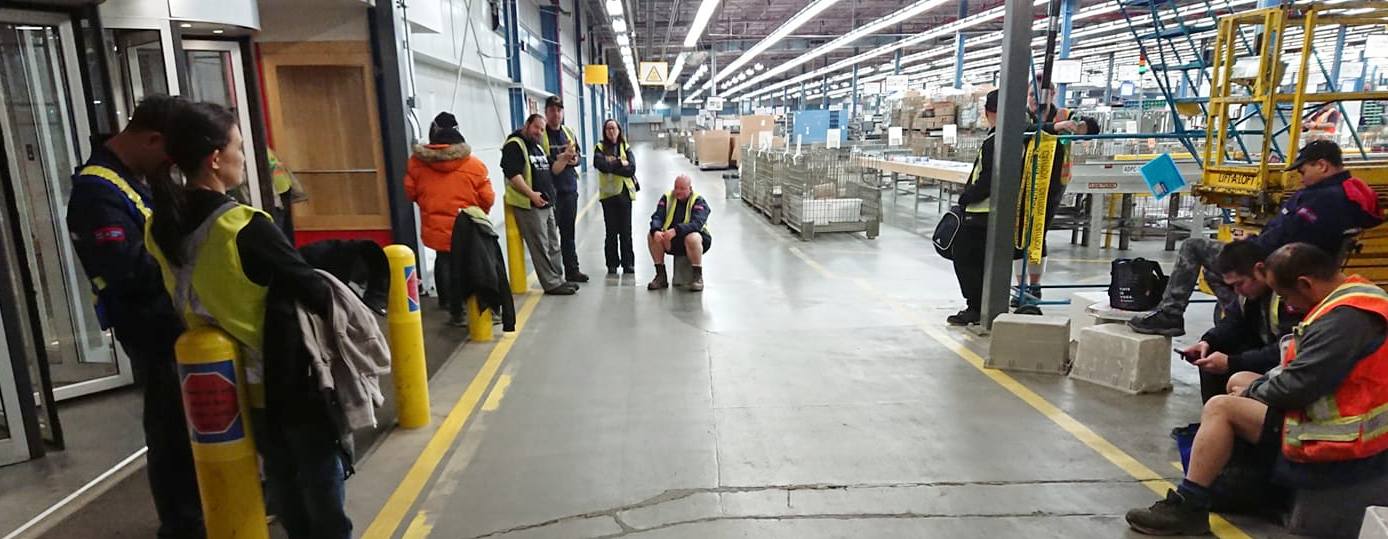
Edmonton, Alberta, November 27, 2018, occupation of
Canada Post processing plant.
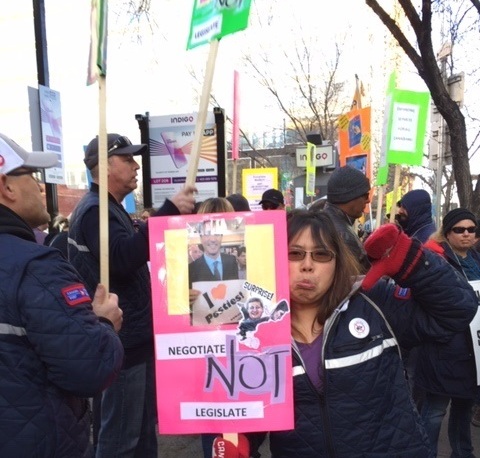 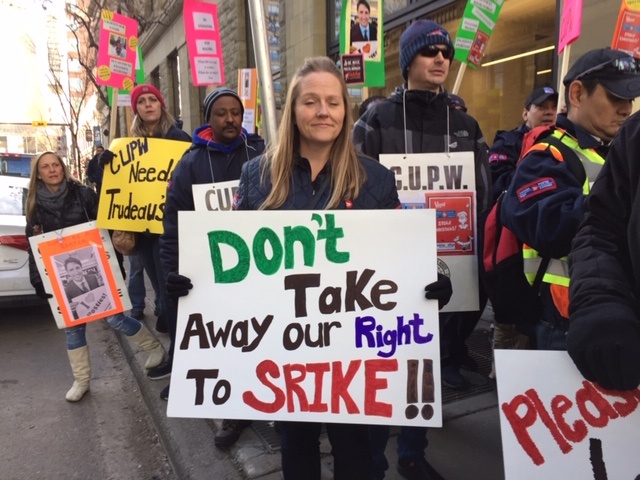
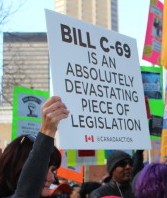 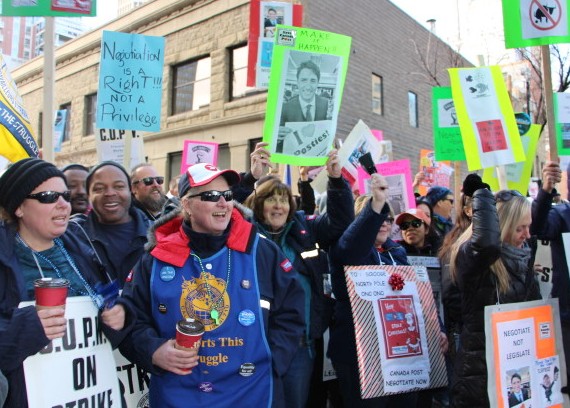
Calgary, November 22, 2018, action against visit by Prime Minister
Trudeau.

  
Richmond, BC, November 28 picket by union allies of CUPW outside the
Pacific postal sorting facility, the third largest in Canada, defies
back-to-work legislation.
 
Rotating strikes: Lac La Hache, BC; Cranbrook, BC
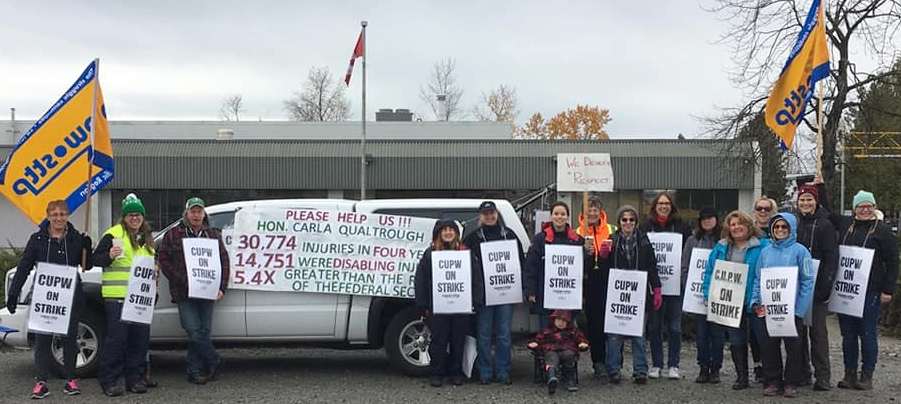
Rotating strike Fraser Valley West, BC
 
Rotating strike Dawson Creek, BC
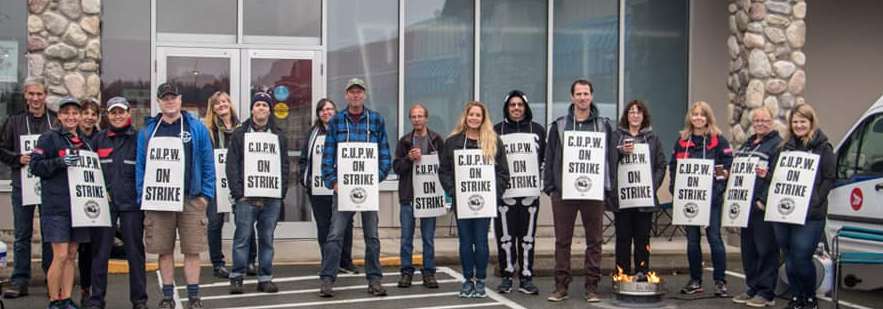
Rotating strike Port Alberni, BC

General Motors to Close Auto Plant in
Oshawa, Ontario
Unifor Local 222 Holds Press Conference
on Oshawa GM Plant Closure
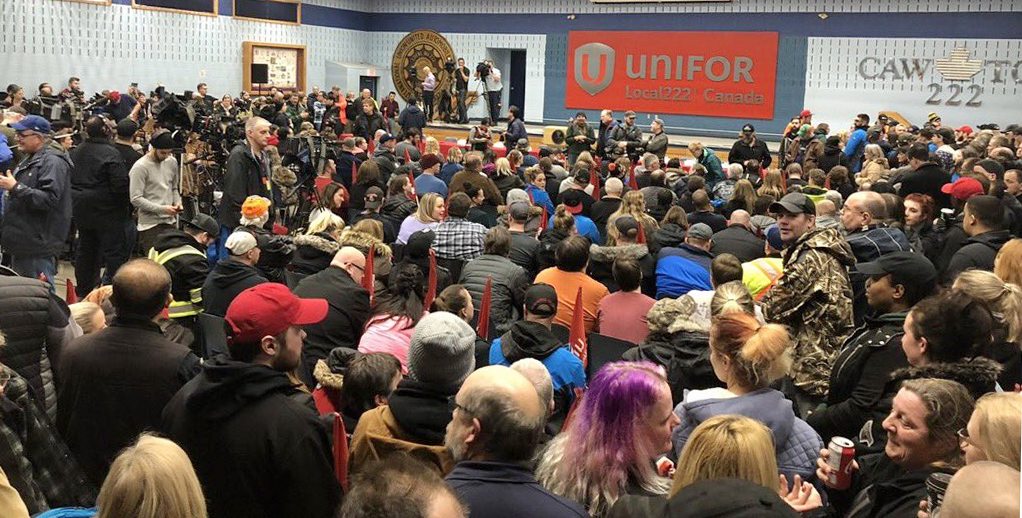
Before General Motors' scheduled 10:00 am
official announcement on the morning of November 26, that it will close
its plant in Oshawa, Ontario, the workers' union, Unifor, told its
members to go home in the morning and for the afternoon shift "to be
with their families." They were informed that a
press conference would
be held at the union hall in the afternoon and asked to
attend in force. That afternoon, the hall was filled to overflowing,
with many workers outside the building unable to hear.
During question period, President of Unifor Jerry Dias
said the Unifor 222 contract has a "no closures" clause for the
duration of the four-year collective agreement which is in force until
2020 and Unifor would hold the company to this. There was a $500
million retooling of the plant in 2017 to allow the
production of trucks. The
union stated it would meet with the "decision-makers" of General Motors
(GM) and then
have their own internal discussion to decide a course of action.
Workers would return to the production lines on Tuesday,
November 27, but "there was no way the workers would
passively continue to make trucks and get screwed in the end," Dias
said.
The plant is the undisputed leader in quality,
productivity and cost efficiency, Dias stated. Oshawa GM workers are
the
best on the continent. The Oshawa community made GM not the other way
around. Unifor is not giving up. There are options and the union will
make the company aware of those options; if production can be
reallocated to Mexico it can
be reallocated to Canada, he said. He rejected Premier Ford's talk of
asking the federal government to extend EI benefits for the workers an
additional five weeks. "We're not talking about EI," Dias said, "we're
talking about maintaining production in Oshawa."
Greg Moffat, Plant Chair with Local 222, spoke to
the press after the press conference and repeated Dias' commitment to
get the company to reverse its decision. He said the union is not
against the company. We're a community and the union's interest is in
keeping production at the site.
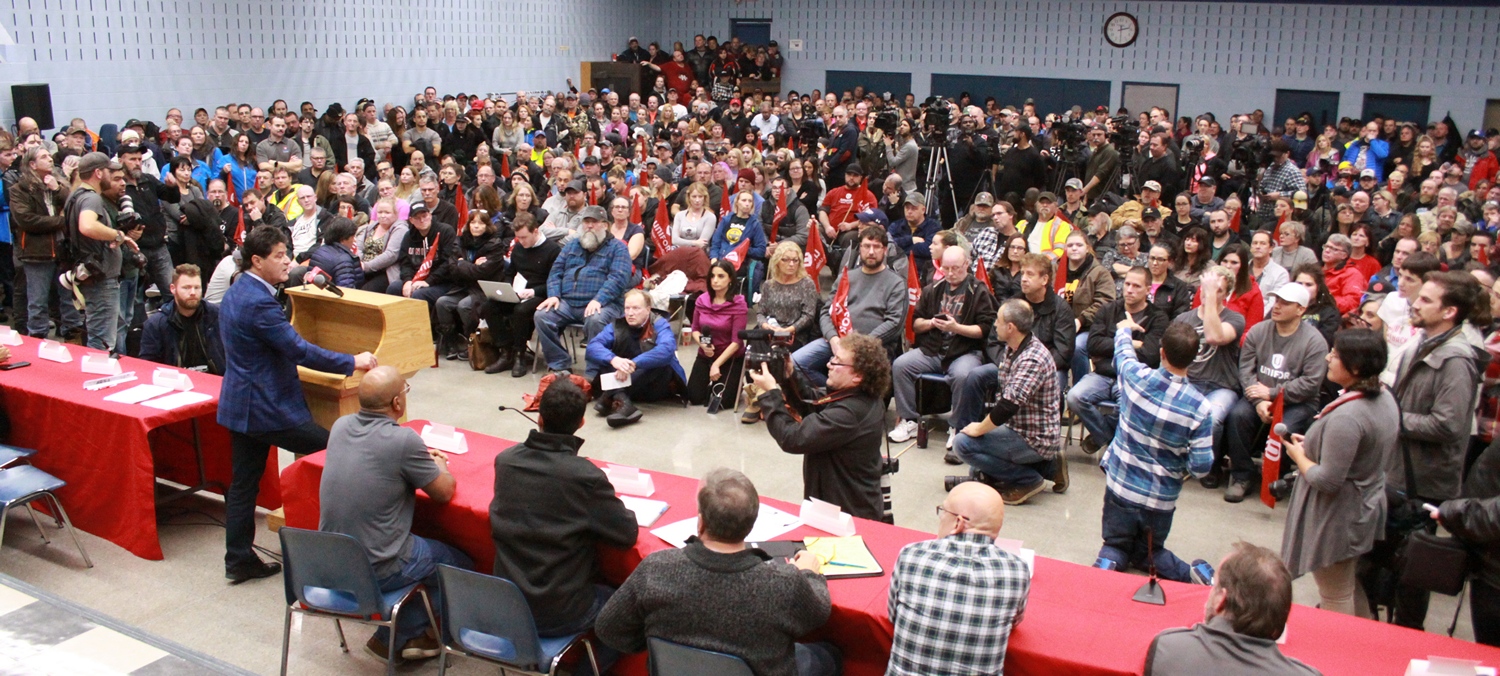


Unifor Calls on General Motors to Allocate
Product to Oshawa
- Unifor -
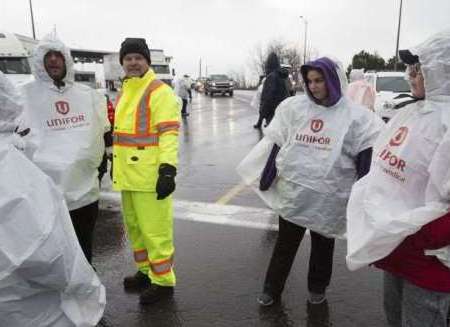 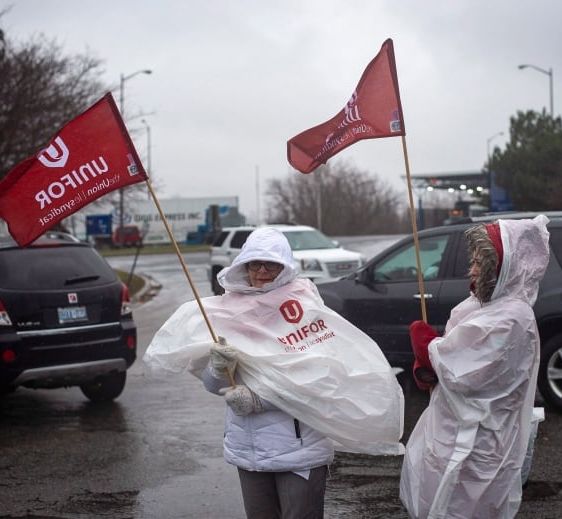
Workers at GM plant in Oshawa walk out and picket at plant gates
Monday, November 26, 2018 prior to GM's announcement in the plant of
the
plant closing.
Unifor is calling on General Motors Canada to allocate
product to the Oshawa Assembly Plant past its current run date of
December 2019.
"Oshawa Assembly is GM's most decorated plant with a
highly skilled, committed workforce," said Unifor National President
Jerry Dias. "Additionally, the [United States-Mexico-Canada Free Trade
Agreement] provides the Canadian auto
industry with firm footing so walking away after a hundred year history
of manufacturing makes no sense."
General Motors announced restructuring of its North
American operations today [November 26], reporting that no product is
currently
allocated to Oshawa Assembly after December 2019.
In February, the Chevy Silverado and GMC Sierra truck
lines successfully launched following a $500 million
transformation that made Oshawa the only plant in North America capable
of building both cars and trucks.
"Unifor does not accept the closure of the plant as a
foregone conclusion," said Dias. "Oshawa has been in this situation
before with no product on the horizon and we were able to successfully
make the case for continued operations. We will vigorously fight again
to maintain these good-paying auto jobs."
GM registered $6 billion U.S. in profits in the
first three quarters of this year and North America is responsible
for 90 per cent of GM's global profits. For each direct job, it's
estimated that there are seven spin off jobs that are key to the local
economy.

Quebec Construction Workers Uphold Their
Rights
Opposition to the Police Regime
Against Construction Workers
- Pierre Chénier -
  
On its website, the Quebec Federation of
Labour-Construction
(FTQ-Construction) reports on its work to defeat the imposition of a
police regime on construction workers. Under the hoax of
maintaining production on the construction sites and preventing
intimidation, this anti-worker police regime is being imposed through
the activities of
construction companies, the state, and a state agency, the Quebec
Construction Commission (CCQ).
FTQ-Construction states it had to intervene recently on
a construction site to stop a company's use of a video surveillance
system that continuously filmed workers while they
were working.
Dealing with another issue, the union expressed its
satisfaction at the acquittal of the workers who, in June 2015,
had
participated in a road blockade at the entrance of the Romaine River
construction site near Havre-Saint-Pierre on Quebec's North Shore. The
blockade was part of a series of simultaneous demonstrations at various
points
on the North Shore to denounce the lack of hiring of local workers on
construction sites. Sometime after the demonstrations, the Director of
Criminal and Penal Prosecutions in Quebec sued seven workers at the
request of the CCQ. The workers faced charges of intimidation,
discriminatory measures, retaliation, and threats or coercion.
The Director alleged the demonstrators prevented workers from outside
the North Shore and investigators from the CCQ from entering the
worksite.
The charges were laid under Act R-20, an Act
respecting labour relations, vocational training and workforce
management in the construction industry. The CCQ has the mandate to
oversee the implementation of this legislation. Act R-20 criminalizes
construction workers by defining their activity in defence of their
rights as
intimidation aimed at hindering or slowing down activity on
construction sites. The wording and intent of Act R-20 harkens back to
nineteenth and early twentieth century legislation banning union
activity as interfering with the market place.
A judge of the Quebec Court declared on October 30
that the evidence submitted by the prosecution against the workers was
inadmissible. The judge found the accumulation of evidence contrary to
section 8 of the Canadian
Charter of Rights and Freedoms, which states, "Everyone has the
right to be secure against unreasonable
search or seizure."
The evidence provided by the CCQ was based on
information that the CCQ had requested from Hydro-Québec for the
stated purpose of laying charges against various protesters. The
information included photos and personal information on all the
demonstrators who participated in the actions. The CCQ also obtained
access to Quebec
Automobile Insurance Corporation (SAAQ) databases, which enabled it to
have access to photos of the demonstrators' driver's licenses. The
judge ruled that this constituted a warrantless search by the CCQ, a
violation of the protesters' privacy and a violation of the right to
peaceful protest. His rejection of the evidence resulted in the
acquittal
of the accused.
In a statement, FTQ-Construction pledges to firmly
oppose these attacks against construction workers. "The CCQ is
overstepping its mandate and violating rights and freedoms. It is
carrying out
a witch hunt against those who defend the rights of workers," writes
Éric Boisjoly, General Manager of FTQ-Construction. "It is time
for the CCQ to
let the union representatives do their job and to focus on its mandate
to ensure the implementation of collective agreements."
It should be noted that construction workers represent
five per cent of the workforce in Quebec, but suffer 25 per cent
of
the work-related deaths that occur each year in Quebec. The
criminalization of workers by companies, the state and its agency the
CCQ, aims at preventing construction workers and their unions from
defending their
rights, including the right to work in safe and healthy conditions and
to work where they actually live. This is unacceptable and must not
pass.

Alberta Workers Oppose Anti-Labour Laws
Local 110 Insulators Rally at Alberta Legislature
- Peggy Askin -

Local 110 of the Heat and Frost Insulators and
Allied Workers Union held a spirited rally at the Alberta legislature
in Edmonton on October 29. The rally was organized to denounce the
current anti-worker labour laws that deprive building trades workers
and their unions of the right to organize and take job actions to
determine
terms of employment acceptable to them.
More than 300 workers participated in the march
and rally, which started at 108 Street and 99 Avenue and
proceeded to the legislature. The demonstrators demanded that the
Alberta NDP government repeal the anti-worker labour laws and replace
them with legal conditions that guarantee their rights to organize and
take
collective action to defend themselves at the workplace.
"This rally has been a big push for a long time,"
Local 110 Business Manager Kevin Lecht said. He emphasized that
the Alberta Labour Relations Code
prevents building trades unions from deciding
when and how bargaining is carried out.
The labour law regime specific to the building trades
was enacted in 1988 during a decade of fierce
resistance to union-busting and assaults on construction workers' wages
and working conditions. The law denies workers the right to bargain
collectively and engage in actions to defend their right to decide what
wages and working conditions are acceptable in return for their
capacity to work. The current anti-worker labour laws impose such
onerous conditions that no legal strike has ever occurred
since 1988, while at the same time employers have imposed ever
worsening terms of employment.
Kevin Lecht said workers expected that an NDP
government would rescind these anti-worker laws because that was its
posture before and during the election. Instead, when the government
made certain changes to labour law, it left intact the entire
anti-worker regime imposed on the building trades. This flies in the
face of the position of the
NDP prior to becoming government.
Workers have rights by virtue of being human and the
producers of all social wealth. If their rights are not upheld within
the law, this does not negate those rights but forces workers to find
other means to affirm their rights in practice. This crisis in
relations of production is seen not only in Alberta with building
trades but across the country
as is now occurring with the Trudeau Liberal government's back-to-work
legislation attacking the rights of postal workers.
Labour laws must, on principle, recognize and uphold
workers' rights, including the basic right to organize themselves into
collectives and engage in actions in defence of terms of employment
acceptable to themselves. Sections 184-191 in the Alberta Labour Relations Code attacking
the rights of building trades workers must be repealed
immediately as a matter of principle and no excuse or delay can be
tolerated.
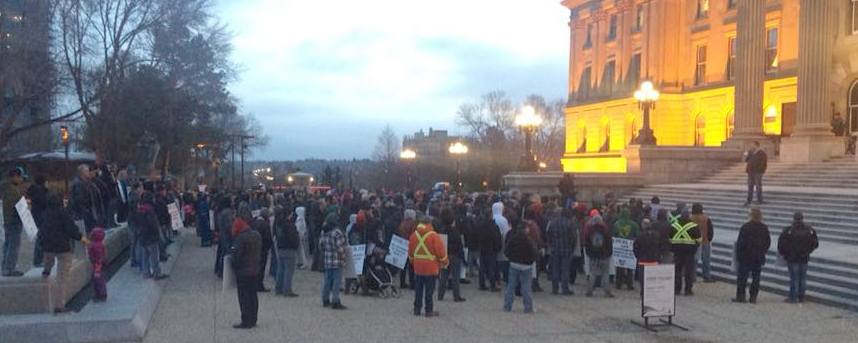

Anti-Worker Labour Laws Must Be Repealed
- K.C. Adams -

"Unstack the Deck" rally in Edmonton, April 30, 2017.
Workers in the building trades in Alberta are
criminalized through a number of provisions in the labour laws designed
to negate the right to collective bargaining and impose wages and
working conditions to which the workers have not given their consent.
The impact of the laws is profound. Many workers are falsely
represented by phony
company unions that have either been organized and recognized by the
employers themselves or put in place with votes of as few as two
workers.
The existing labour law imposes a system of collective
bargaining on the building trades unions designed to block workers from
taking strike action to defend their rights. The requirements for a
strike vote are such that there has not been a single "legal"
strike in the building trades since the laws were enacted in 1988.
These laws
are a frontal attack on the right of workers to decide collectively on
wages and conditions of work acceptable to them, which reflect the
skills and value of the capacity to work they sell to their employers
and reproduce through their work-time.
According to the Alberta government, the construction
industry in Alberta had an annual gross income of $94 billion
in 2014 or contribution to Gross Domestic Product (GDP) of new
value of around $35 billion. Construction workers create this new
social wealth, which includes their own reproduced-value and
added-value
expropriated by their employers.
The oligarchs who control the sector constantly
conspire to degrade workers' terms of employment, amongst other things
reducing the claim of workers on the new value they produce, which
consists of their reproduced-value as their individual wages and social
programs available to all. The reduction of reproduced-value as wages
and social
programs increases the added-value the oligarchs expropriate from new
value for their private interests as company profit, interest profit
and rent profit.
Since the labour laws were enacted in 1988,
production in the oil sands has grown from 0.33 million barrels/day
(b/d) in 1989 to 3.28 million b/d in 2018, without a
single strike by any union involved in the construction of the oil
sands, upgraders, refineries, petrochemical plants, office towers or
any other aspect of the
energy industry or any other industry in Alberta.
Big oil and the global contractors demand that
governments criminalize workers fighting to defend their rights, and
governments have responded with laws that make it virtually impossible
to carry out a legal strike in defence of workers' interests. Many
workers point out that the laws enacted in 1988 and since that
time have led to a
serious deterioration in their working conditions. For example, all the
workers working under Christian Labour Association of Canada (CLAC)
agreements have no defined-benefit pension plans, only precarious
savings plans, which provide no security in retirement.
Governments and labour boards make pious claims how the
existing labour laws bring stability to the construction sector and
therefore are in "everyone's" interests. But what is meant by stability
and everyone? Certainly not stability for the workers. They have no
security going from boom to bust and often unemployment while
frequently
enduring long hours on jobs away from home and loved ones. Even
seniority has become meaningless in some trades as contractors demand
the right to decide whom they hire, and the law facilitates this with
deal-making using phony company unions.
Construction workers confront some of the most
difficult and dangerous working conditions of any industry. Daily, they
face injury and death, often working outside in the bitter cold in
conditions that are harmful to their health and well-being.
Construction workers build everything from schools and
hospitals, bridges, office towers, refineries and oil sands plants
creating enormous new social wealth much of which is expropriated as
added-value to serve the private interests of the financial oligarchy,
those who own and control the socialized economy either through
ownership of
companies or debt.
The oligarchs and their political representatives
define instability narrowly, as whatever they consider an impediment to
the success of their projects and the amount of added-value they can
expropriate from the socialized economy. The oligarchs possess an
outdated outlook of class privilege that views Canadian natural
resources and the
socialized economy, including working people, as a target of
exploitation
without restrictions. The 1988 labour laws were enacted according
to this anti-social outlook and in response to the demand of the
oligarchs to criminalize anything that threatens what they consider
their entitlement and right to expropriate the largest amount possible
from the new value workers produce. Any disruption to this right and
privilege of the oligarchs, such as the strike struggle of postal
workers for terms of employment to solve problems they face at the
workplace, should be declared illegal and subjected to harsh and even
crippling penalties.
The starting or reference point for these anti-worker
labour laws is not the conditions of work, terms of employment
acceptable to workers ensuring their well-being, but the private
interests of those who make fortunes on the backs of the workers who
produce the social wealth. The laws intervene in relations of
production on the side of the
oligarchs to the detriment of those who do the work. This must change.
Anti-social labour laws are unacceptable in modern Canada.
Workers have rights by virtue of being human and the
producers of social wealth. The starting or reference point must be the
rights of the working people. Labour laws must recognize and uphold
workers' rights including the basic right to organize themselves into
collectives and engage in actions in defence of terms of employment
acceptable
to themselves. Alberta working people and their organizations demand
that sections 184-191 of the Labour
Relations
Code be repealed immediately. This repeal is a matter
of upholding the rights of the working class.

Alberta Boilermakers and Operating Engineers
Fight to Overturn Anti-Worker Labour Laws
Boilermakers and Operating Engineers in Alberta have
filed a Statement of Claim to overturn sections of the Alberta Labour Relations Code that
severely restrict their right to bargain collectively the terms of
employment with employers.
 The unions filed a claim on
October 15, seeking a declaration that all or part of
sections 184-191 of the Labour
Relations Code are unconstitutional and violate the right to
freedom of association, making them of no force and effect and
inoperative. The unions are also seeking interim relief from the law
for current negotiations, as all
building trades collective agreements for the construction sector
expire April 30, 2019.[1] The unions filed a claim on
October 15, seeking a declaration that all or part of
sections 184-191 of the Labour
Relations Code are unconstitutional and violate the right to
freedom of association, making them of no force and effect and
inoperative. The unions are also seeking interim relief from the law
for current negotiations, as all
building trades collective agreements for the construction sector
expire April 30, 2019.[1]
Local 955 of the International Union of Operating
Engineers and Local 146 of the International Brotherhood of
Boilermakers say the Code creates a situation where they cannot
negotiate the provisions of their own collective agreements.
Christopher Flett, business manager of Local 955 explains, "We
want to determine our
own wages, benefits and working conditions, nothing more and nothing
less. In effect, the provisions of the Code prevent us from negotiating
on the concerns of our members. This has to change."
Hugh MacDonald, Business Manager of Local 146
adds, "Our contracts expire next April. It's crucial for us that the
denial of our constitutional rights is on the table before we have to
go through this sham of a bargaining process again."
In their legal challenge, the unions point out that not
a single "lawful" strike in the construction sector has occurred in
Alberta since 1988, because the law makes a strike in any
individual building trades sector virtually impossible. In 2007,
workers shut down many major projects in an "illegal" strike to protest
the draconian laws.
In 2010, the unions attempted to work within alternative
arrangements known as "framework bargaining." Both unions have
withdrawn from the framework agreement for this round of bargaining,
concluding that it did not enhance their ability to bargain
collectively on behalf of their members.
Provisions of Sections 184-191 of the Anti-Worker
Alberta Labour Relations Code
Sections 184-191 establish a collective bargaining
procedure that lumps different building trades unions into bargaining
groups to negotiate their contracts, normally into four groups. The
designation into groups is based on which trades would be on a jobsite
at the same or similar time.
A legal strike requires a supervised vote. No
supervised vote can take place until 60 per cent of the unions
within a bargaining group apply for a strike vote. The remaining unions
within the group must also participate in the strike vote, irrespective
of whether they have decided to take a strike vote. Even a union which
has reached a
tentative agreement but has not yet completed its ratification process
must participate in the strike vote. The strike vote will not be
counted until every union has completed their strike vote and all
employer objections have been ruled on.
When the votes are finally counted, at least 60
per cent of the unions in the group must have a majority of votes in
favour of a strike. At least 60 per cent of the members who vote
from a consolidated group must vote in favour of a strike. If the
strike vote were to succeed under these onerous conditions, all unions
must issue
strike notice at the same time, depriving each union of the ability to
use its collective strength at a time of its choosing.
Once 75 per cent of a group has settled their
collective agreements, the remaining unions without collective
agreements must cease bargaining and submit to compulsory arbitration.
A strike (or lockout) in progress is deemed terminated, and no union is
permitted to go on strike. Because of significant difference in the
size of the unions,
a strike can be declared illegal while more than 50 per cent of
the workers in the general construction sector have not negotiated and
ratified a collective agreement. Unions that have not reached an
agreement are then forced into arbitration.
The Minister of Labour has the sole power to appoint a
Construction Industry Disputes Resolution Tribunal and to determine its
composition. The unions have no say about the composition of the
tribunal or its processes. These tribunals generally make awards based
on the "industry standard" of agreements signed, but generally award
very
limited or no retroactivity. This means that in addition to being
denied the right to defend their rights through collective action, the
workers who did not reach an agreement are further penalized by being
denied retroactive pay.
The Alberta Federation of Labour (AFL) submission on
the labour law review states, "This means that the building trades
union that made an effort to collectively bargain terms and conditions
unique to their trade and membership can be totally undermined by the
Registered Employer Organization simply delaying the bargaining of
those
unique terms. Then, once 75 per cent of the other trades settle
their collective agreements, the industry pattern is imposed on that
union and its members."
Note
1. The Statement of Claim to declare
sections 184-191 of the Labour
Relations Code unconstitutional and seeking interim relief from
the law for current negotiations can be found here.

PREVIOUS
ISSUES | HOME
Website: www.cpcml.ca
Email: office@cpcml.ca
|

